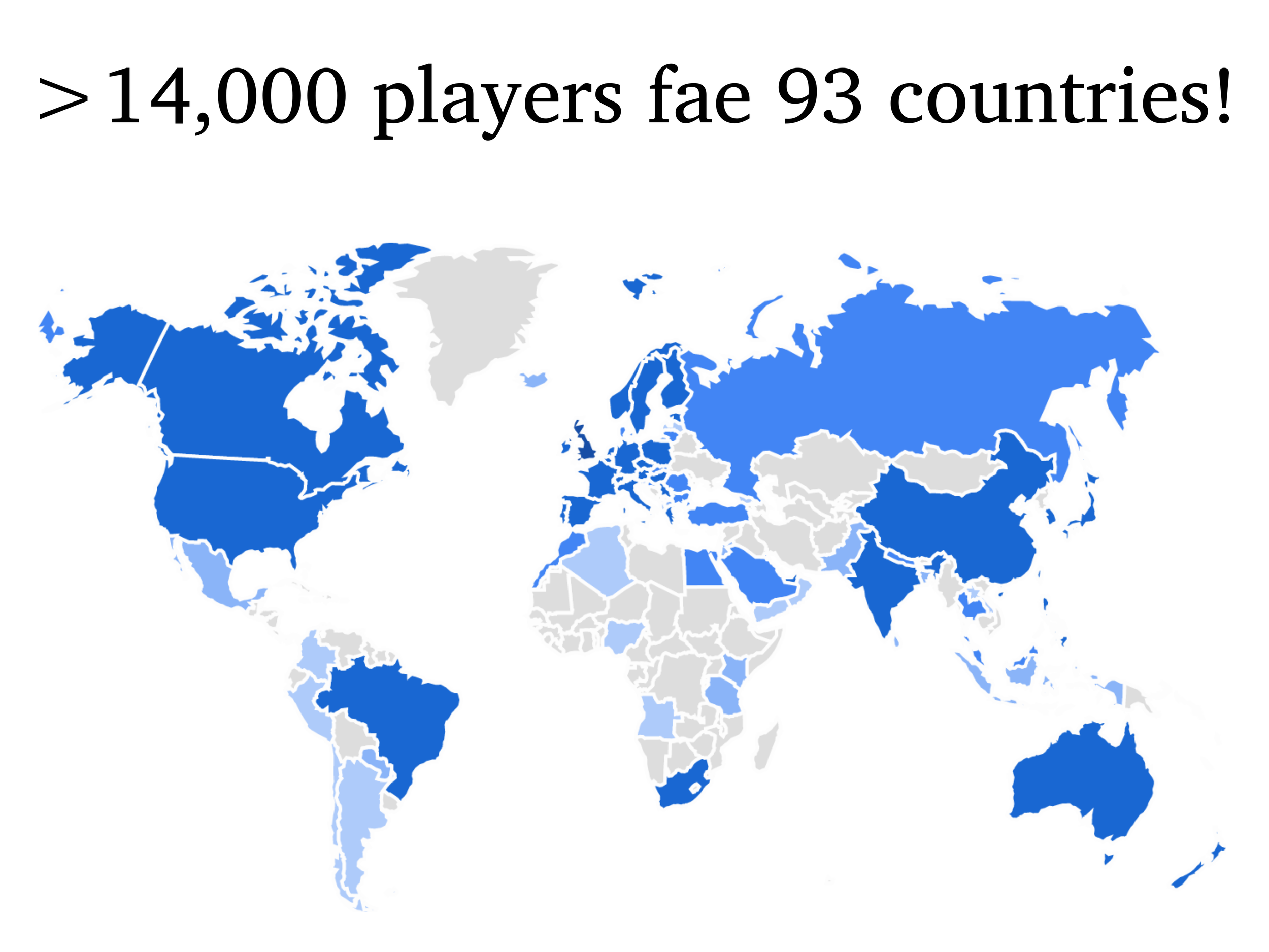Wirdle solutions week 14
We're pleased to announce that as of today the Shaetlan Wirdle has had more than 14,000 players from 93 countries. Here are the solutions for this week! Scroll for one word at a time to get the correct answer, it's meaning, and the history of the word. Last you'll find the main references we use for the etymologies, and the latest map of players. You'll find the principles of our spelling system at https://www.iheardee.com/english/spelling-in-shaetlan.
✅
It's important to remember that "Old English" was never a monolithic language, but rather is a cover term for four distinct North Sea Germanic varieties. The direct ancestor of Scots was Northumbrian Old English. The direct ancestor of English was Mercian Old English. But most of the existing data comes from West Saxon Old English. Wherever possible we have given the Northumbrian Old English forms, since the main ancestors of Shaetlan are Norn and Scots (not English), with a lot of Dutch/Low German influence.
✅
With thanks again to Julie for hatching the idea and to Andrew for making it possible! 🤗
fling ‘fling, throw; kick’
History: both English and Scots have this word from Old Norse. The Old Scots fling, flyng is attested from 1375 with the meaning ‘to kick’ and from 1528 with the meaning ‘to dance’. The Old Norse flengja ‘to whip; to throw’ is still Icel. flengja, Far. fleingja ‘to spank’, No. flenge ‘to (violently) rip open/off’, Sw. flänga, Da. flænge ‘to fling, throw; to rush (about)’. It ultimately derives from Proto-Germanic *flangijaną ‘to beat, whip’, which comes from Proto-Indo-European *plah₂k-/*plah₂g- ‘to beat’.
heivy ‘heavy’
History: there are various forms attested in Old Scots, such as hevy(e), hevi(e), hewy(e), h(e)avy, ha(y)vie, hawy(e), etc. The northern Old English form was hæfig and came from Proto-Germanic *habīgaz ‘heavy; severe’, which in turn came from Proto-Indo-European *keh₂p- ‘to grasp, take, seize, hold’.
vaams plural of vaam ‘a spell; an odour, aroma’
History: this word is Shetland specific. It descends from Old Norse vamm ‘injury; blemish, defect’, which itself is a bit of a mystery, but has several Old Germanic cognates, such as Gothic *wamm ‘spot, blemish’. The ultimate origin is obscure but might go back to the Proto-Indo-European *wem- ‘spittle, vomit’.
eense ‘once’
History: the earliest Scots forms are anis and anys, but ainis and anes soon followed. The word comes from Old English ænes, anes, etc meaning ‘once’. It was originally Old English ǽne ‘once’ + the genitive (possessive) suffix ‑es, but later it got reanalysed to ān ‘one’ + ‑es. The final unvoiced ‑s began to be spelt ‑ce from about the early 16th C. The forms with a back rounded vowel (o-sound) are younger than the northern front unrounded vowel (e-/æ-sound) and only start in Middle English in the southern varieties. See our post from 3 January 2022.
swaet ‘sweat’
History: Old Scots had various forms, such as swet(e), sweit, sweat, etc. They descend from Old English swætan ‘to sweat’ and swāt ‘sweat’, which come from Proto-Germanic *swait- ‘sweat’ and ultimately go back to Proto-Indo-European *sweyd- ‘sweat; to sweat’.
floss ‘the rush (Juncus effusus)’
History: this word is only attested in the former Norn speaking areas. The first attestations are from Orkney (floss in 1623 and flos ‘band’ in 1633). The origin of the words is obscure, but it might come from Old Norse flus ‘thin peel, rind’, which survives in No. flos, flus ‘a rind, a scale, strip peeled off (e.g. potato peel)’ and flysja ‘to peel’, (cf. also Far. flus ‘peelings; dandruff’ and Sw. flasa ‘to peel, strip fluff off of, etc’). The semantic shift would in that case possibly be due the uses to which the rush is put.
tresh ‘thresh’
History: this is a very old word. The Old English þrescan, ðærsca, ð(e)arsca go back to Proto-Germanic *þreskaną ‘thresh’, which go back to Proto-Indo-European *terh₁- ‘to rub, turn; to drill, pierce’. For more about the “th”-sounds in Shaetlan, see our post from 23 October 2021.
References
Bokmålsordboka. 2022. Språkrådet og Universitetet i Bergen. Available at http://ordbøkene.no.
Christie-Johnston, Alastair & Adaline Christie-Johnston. 2014. Shetland words. A dictionary of the Shetland dialect. Lerwick: The Shetland Times.
de Vaan, Michiel. 2008. Etymological dictionary of Latin and the other Italic languages. Leiden, Boston: Brill
de Vries, Jan. 1977. Altnordisches etymologisches Wörterbuch. Leiden: Brill.
DSL Online. 2002. Glasgow: The University of Glasgow. Available at https://dsl.ac.uk/.
Heggestad, Leiv, Finn Hødnebø & Erik Simensen. 1993. Norrøn ordbok. 4th edn of Gamalnorsk ordbok. Oslo: Det norske samlaget.
Hellquist, Elof. 1993. Svensk etymologisk ordbok. 3rd edn. 2 Vols. Malmö: Gleerups.
Jakobsen, Jakob. 1985 [1928]. An etymological dictionary of the Norn language in Shetland. Lerwick: The Shetland Times.
Kroonen, Guus. 2013. Etymological dictionary of Proto-Germanic. Leiden: Brill.
Lehmann, Winfred P. 1986. A Gothic etymological dictionary. Leiden: Brill.
Macbain, Alexander. 1911. An etymological dictionary of the Gaelic language. Stirling: Eneas Mackay.
Marwick, Hugh. 1929. The Orkney Norn. Oxford: Oxford University Press.
Matasović, Ranko. 2009. Etymological dictionary of Proto-Celtic. Leiden: Brill.
Nielsen, Niels Åge. 1995. Dansk etymologisk ordbog. Ordenes historie. 4th edn. København: Gyldendal.
Nynorskordboka. 2022. Språkrådet og Universitetet i Bergen. Available at http://ordbøkene.no.
OED Online. 2021. Oxford: Oxford University Press. Available at https://www-oed-com.ezproxy.uni-giessen.de.
Orel, Vladimir. 2003. A handbook of Germanic etymology. Leiden: Brill.
Pfeifer, Wolfgang (ed.). 1997. Etymologisches Wörterbuch des Deutschen. München: Deutscher Taschenbuch Verlag.
Pokorny, Julius. 1994. Indogermanisches etymologisches Wörterbuch. 3rd edn. 2 Vols. Tübingen: Francke Verlag.
Torp, Alf. 1919. Nynorsk etymologisk ordbok. Kristiania: Forlaget H. Aschehoug & Co.
Zoëga, Geir T. 1896. English-Icelandic dictionary. Reykjavík: Sigurður Kristjánsson.
Zoëga, Geir T. 1922. Icelandic-English dictionary. 2nd edn, enlarged. Reykjavík: Sigurður Kristjánsson.

